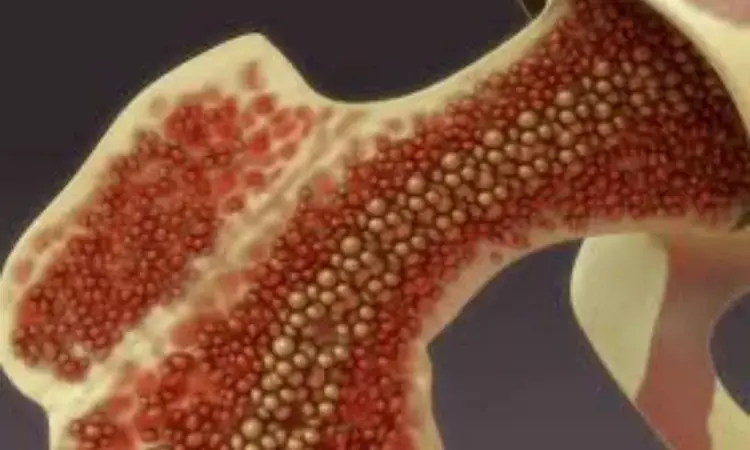- Home
- Medical news & Guidelines
- Anesthesiology
- Cardiology and CTVS
- Critical Care
- Dentistry
- Dermatology
- Diabetes and Endocrinology
- ENT
- Gastroenterology
- Medicine
- Nephrology
- Neurology
- Obstretics-Gynaecology
- Oncology
- Ophthalmology
- Orthopaedics
- Pediatrics-Neonatology
- Psychiatry
- Pulmonology
- Radiology
- Surgery
- Urology
- Laboratory Medicine
- Diet
- Nursing
- Paramedical
- Physiotherapy
- Health news
- Fact Check
- Bone Health Fact Check
- Brain Health Fact Check
- Cancer Related Fact Check
- Child Care Fact Check
- Dental and oral health fact check
- Diabetes and metabolic health fact check
- Diet and Nutrition Fact Check
- Eye and ENT Care Fact Check
- Fitness fact check
- Gut health fact check
- Heart health fact check
- Kidney health fact check
- Medical education fact check
- Men's health fact check
- Respiratory fact check
- Skin and hair care fact check
- Vaccine and Immunization fact check
- Women's health fact check
- AYUSH
- State News
- Andaman and Nicobar Islands
- Andhra Pradesh
- Arunachal Pradesh
- Assam
- Bihar
- Chandigarh
- Chattisgarh
- Dadra and Nagar Haveli
- Daman and Diu
- Delhi
- Goa
- Gujarat
- Haryana
- Himachal Pradesh
- Jammu & Kashmir
- Jharkhand
- Karnataka
- Kerala
- Ladakh
- Lakshadweep
- Madhya Pradesh
- Maharashtra
- Manipur
- Meghalaya
- Mizoram
- Nagaland
- Odisha
- Puducherry
- Punjab
- Rajasthan
- Sikkim
- Tamil Nadu
- Telangana
- Tripura
- Uttar Pradesh
- Uttrakhand
- West Bengal
- Medical Education
- Industry
Imetelstat reduces RBC transfusion dependence in patients with lower-risk myelodysplastic syndromes

USA: An investigational, first-in-class telomerase inhibitor was shown to improve rates of red blood cell (RBC) transfusion independence in patients with lower-risk myelodysplastic syndromes (MDS) who relapsed or were refractory to standard treatment, findings from randomized IMerge trial reveal.
"Treatment with imetelstat helped heavily transfused patients who failed on erythropoiesis-stimulating agents (ESAs), to achieve significantly higher rates of RBC transfusion independence for at least 8 weeks compared to those treated with a placebo (40% versus 15%)," the researchers reported in the study published in The Lancet.
Additionally, RBC transfusion independence was sustained with imetelstat, with 83% of 8-week responders having a single continuous transfusion independence period versus 56% of responders in the placebo group.
"The prolonged transfusion independence seen in this patient population with imetelstat underscores the potential for this novel agent as a second-line therapy in lower-risk MDS," the study stated.
Currently, ESAs are the standard first-line treatment for symptomatic anaemia in lower-risk MDS patients, however, many patients do not respond to lose response within roughly 2 years. In a phase 2 trial, imetelstat, a competitive telomerase inhibitor, showed promising results; it demonstrated a meaningful durable transfusion independence rate across a broad range of heavily transfused patients.
Prof Uwe Platzbecker, University Hospital Leipzig, Leipzig, Germany, and colleagues aimed to compare the RBC transfusion independence (RBC-TI) rate with imetelstat versus placebo in patients with RBC-TD LR-MDS.
The randomised, multinational, double-blind, placebo-controlled, phase 3 trial was conducted at 118 sites in 17 countries comprising 178 patients. From 2019 to 2021. 118 patients were randomly assigned to imetelstat 7.5 mg/kg every four weeks and 60 patients were assigned to placebo.
The median age of the patients was 72 years and 62% were men. They were heavily transfused with a median previous RBC transfusion burden of 6.0 units over eight weeks. Overall, 90% of patients had previously received an ESA, and 6% had previously received luspatercept.
The primary endpoint was 8-week RBC transfusion independence (RBC-TI), defined as the proportion of patients without RBC transfusions for at least 8 consecutive weeks starting on the day of randomisation until subsequent anti-cancer therapy, if any.
The researchers reported the following findings:
- After a median follow-up of 19.5 months for the imetelstat group and 17.5 months for the placebo group, patients received a median of eight treatment cycles of each, with a median duration of treatment of 33.9 weeks and 28.3 weeks, respectively.
- The primary endpoint of RBC transfusion independence for at least 8 weeks was also reached in 45% and 32% of patients with and without ring sideroblasts in the imetelstat group versus 19% and 9%, respectively, in the placebo group.
- Among patients who had 8-week RBC transfusion independence, the median increase in blood haemoglobin from before treatment to the peak during the longest independence period was 3.55 g/dL in the imetelstat group versus 0.80 g/dL in the placebo group.
- Grade 3 or 4 treatment-emergent adverse events (TEAEs) occurred in 91% of patients receiving imetelstat and 47% of those receiving placebo.
- The most common grade 3/4 TEAEs in patients taking imetelstat were neutropenia (68% vs 3% with placebo) and thrombocytopenia (62% vs 8%). No treatment-related deaths were reported.
"Imetelstat offers a novel mechanism of action with durable transfusion independence (about 1 year) and disease-modifying activity for heavily transfused patients with LR-MDS who are not responding to or are ineligible for ESAs," the researchers concluded.
Reference:
Platzbecker, U., Santini, V., Fenaux, P., Sekeres, M. A., Savona, M. R., Madanat, Y. F., Díez-Campelo, M., Valcárcel, D., Illmer, T., Jonášová, A., Bělohlávková, P., Sherman, L. J., Berry, T., Dougherty, S., Shah, S., Xia, Q., Sun, L., Wan, Y., Huang, F., . . . Zeidan, A. M. (2023). Imetelstat in patients with lower-risk myelodysplastic syndromes who have relapsed or are refractory to erythropoiesis-stimulating agents (IMerge): A multinational, randomised, double-blind, placebo-controlled, phase 3 trial. The Lancet. https://doi.org/10.1016/S0140-6736(23)01724-5
Dr Kamal Kant Kohli-MBBS, DTCD- a chest specialist with more than 30 years of practice and a flair for writing clinical articles, Dr Kamal Kant Kohli joined Medical Dialogues as a Chief Editor of Medical News. Besides writing articles, as an editor, he proofreads and verifies all the medical content published on Medical Dialogues including those coming from journals, studies,medical conferences,guidelines etc. Email: drkohli@medicaldialogues.in. Contact no. 011-43720751


